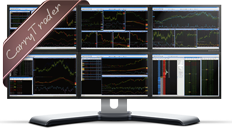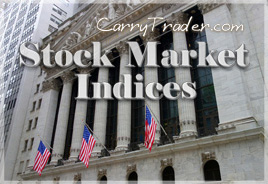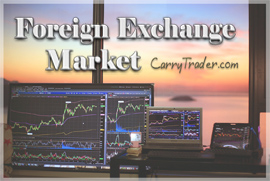CFD Trading Tutorial & Tips

What is it about?
A CFD is a financial instrument that allows investors to speculate on the global financial markets. The underlying asset of a CFD can be a Forex currency, an index, a stock, or even a cryptocurrency asset. CFDs are able to mirror the price fluctuations of any market by allowing investors to trade in both directions.
CFD trading offers some unique advantages to world traders. However, there are also some disadvantages. For example, carry traders and scalpers cannot implement their strategies by using CFDs.
Selecting the right CFD broker is very important, as there can be significant differences between the trading conditions of different CFD brokers.
Here are the basics of CFD trading.
What is a CFD Contract?
CFD means 'Contract for Difference' and refers to an OTC (over-the-counter) derivative product. When you open a CFD position you gain or lose money based on the price movements of the underlying asset. CFD contracts can be used for trading any financial market including Forex currencies, equities, precious metals, energies, cryptocurrencies, etc.
While other derivative instruments involve complicated calculations to determine their market price, CFD prices are identical to the underlying asset's price. That means that if you buy crude oil using a CFD contract, you will buy it at almost the exact same price as the current crude oil price. That makes it extremely easy to monitor your trade positions.
Trading Charges (Spreads and Commissions)
Almost all CFD brokers exclusively charge a spread between bid and ask prices, and do not charge trading commissions. For example, you pay a 2-pip spread to trade EURUSD, a few points spread to trade the Dow Jones Industrial, etc.
If you maintain your CFD position after midnight, your position becomes subject to overnight charges (SWAP Rates). However, if you trade CFDs on Futures, you do not pay SWAP rates at all. That makes CFDs on Futures ideal instruments for swing traders who tend to maintain their positions for many weeks.
Profit/Loss
When you trade any asset via CFDs, your profit/loss depends on the movements of the real market and can be easily calculated. If the price of the underlying asset has risen between the time you have opened your position and the time you close it, then you make a profit. If the price of the underlying asset has fallen below, then you suffer a loss.
CFD Brokers & Trading Features
These are some key issues when choosing CFD brokers:
(1) Safety of Money
Most large CFD brokers are regulated, but not all. Recent legislation in the EU forced many CFD brokers to move to offshore countries such as Belize and Seychelles. That is not good news for CFD traders. However, there are still a lot of CFD firms that are domiciled in the EU and the UK. Some of these CFD companies are even listed in major stock markets (mainly in the UK).
The good news is that almost all large CFD firms offer 'Bank Account Segregation' to all their clients. Never open an account with a financial firm that doesn't offer 'Bank Account Segregation'.
(2) The Delta Factor Advantage
One of the key features of CFDs is their ability to imitate the price behavior of the underlying asset. CFDs follow their underlying asset more closely than any other derivative product. That makes monitoring your CFD positions and placing orders an easy task. This behavior of underlying asset price imitation can be described as Delta Factor equals one. In other words for a $1.20 change of the underlying asset your CFD position will also be changed by $1.20.
(3) Easy-To-Use Web Platforms & MT4
CFD brokers usually offer a web-trading platform, and sometimes also MT4. A web-trading platform can easily be used even by beginners, however, it lacks the advanced features built-in MT4/MT5. Some brokers offer CFD trading within MetaTrader-4, supporting automated trading, back-testing, advanced charting, trading-on-charts, etc.
(4) Wide Asset Index
CFDs can simply mirror the price movements of any financial asset. There are hundreds of available assets including Forex Majors, Minors, and Exotic Currencies, 100s of world shares, indices, precious metals, energies, and cryptocurrencies.
- CFD traders can easily open positions in both market directions.
(5) CFDs o Futures (avoid paying overnight rates)
Some CFD brokers offer Futures trading via CFDs, which can be very useful for swing traders who maintain their positions overnight. More specifically, when you trade a financial asset via CFDs, there are two different options:
□ Trade it on Cash. That means you enjoy a tight spread but if you keep your positions overnight, you pay overnight charges.
□ Trade it on a CFD Future. In this case, you pay a wider spread than trading on cash. However, you DON’T have to pay any overnight charges. That is a huge advantage for some traders, that tend to maintain their positions for days/weeks.
If you can spot and ride strong trends, you can make decent profits by trading CFDs on Futures.
(6) Capital Leverage
As in the case of any other derivative product, CFDs offer the option for capital leverage. The combination of capital leverage and CFD Futures can have positive results, given you apply tight money management. Capital leverage increases the risk of your portfolio, therefore, you should use it with extreme caution.
(7) Trading Accounts
CFD brokers offer many account options. Most of the time, they support more than five different payment methods including cards, bank wire, Paypal, Skrill, Neteller, and many others. In addition, usually CFD brokers don’t charge any commissions on deposits/withdrawals (use the live chat service to ensure it). The deposit requirements are extremely low, as you may start an account even with just $10.
Also, all CFD brokers offer a free practice account. It is better to start from there, so you can test each broker's trading conditions in real-time, before moving into a real account.
(8) Promotions for New Clients
CFD brokers used to offer very good promotions for new traders. They used to offer a welcome cash bonus and trading rebates. However, the recent legislation changes in the EU forbids most of these promotions. The only CFD brokers offering today decent promotions are domiciled in offshore countries.
In any case, promotions shouldn’t be seen as priority number one for any trader. Priority number one is the Safety of Money, and number two is the Cost of Trading.
Five (5) Types of CFD Contracts
These are the main types of CFD contracts:
(i) Currency CFDs
Currency CFDs can trade any Forex currency (major, minor, cross, and some exotic currencies) on a 24/5 basis. The Foreign Exchange market is very liquid and that means paying tight spreads. The less-expensive pairs to trade are EURUSD, GBPUSD, and USDJPY.
(ii) Commodity CFDs
Commodity CFDs include energies, precious metals, industrial metals, and popular agricultural commodities. The spread when trading popular commodities such as gold (XAU/USD) or crude oil is very tight. Other less-popular commodities may involve considerably higher spreads (i.e. Sugar or Cocoa). CFDs on Futures can be very useful if you plan to maintain your trade positions for many days or even weeks. For example, you can trade crude oil via a CFD on Futures for a 5-point spread while you pay zero-trading commissions and zero-swap overnight rates.
(iii) Index CFDs
You can trade tens of different stock indices including Dow Jones Industrial, S&P500, and Nasdaq. You can also trade many European markets (DAX, FTSE, CAC-40, etc.) plus many indices from Asia and Australia.
(iv) Share CFDs
You can trade thousands of shares from all around the world. Be very careful with the spreads you will be charged, as where there is no liquidity the spread between ask/bid can become extremely expensive.
(v) Interest rate CFDs
Interest rate CFDs offer access to a market that most traders don’t even know exists. Interest rate securities can be traded simply for speculation or for hedging against interest rate risk.
Advantages when Trading CFDs
(1) Great variety of trading assets, no physical settlement is required
(2) You may trade CFDs using the advanced charting capabilities of MetaTrader4/MetaTrader5
(3) Easy to short any asset using capital leverage, including shares and cryptocurrencies
(4) Zero-swap overnight charges when you trade CFDs on Futures
(5) You may use automated Expert Advisors (robots) to trade CFDs
(6) You may open an account by selecting between tens of CFD brokers, and start on a practice account
(7) CFD prices are identical to the underlying asset prices. That makes trading easy even for beginners
CFD Trading Tips
These are some essential trading tips for CFD Traders:

(1) Choose a CFD Broker wisely
When trading online, give a lot of attention to the safety of your money. Choose among regulated CFD providers, offering segregated client bank accounts, that have been in the market for more than 5 years. Apart from funds safety, other issues matter when choosing a CFD broker. For example, the suitability of funding methods, the availability of desired assets, trading platforms, etc.
Last but not least is the cost of trading. CFD brokers don't charge trading commissions, they charge only a trading spread between ask and bid. That makes things easier, as you can directly compare the spreads charged by different CFD brokers.
» Compare Forex/CFD Brokers on CarryTrader
(2) Focus on a few Trading Assets
It is far better to concentrate on a few trading assets than try to trade many different CFD assets. Become an expert on those assets. Many professional traders choose to trade solely one asset, for example, they trade only EURUSD or only Gold, or only Bitcoin. These 3 markets are characterized by enormous liquidity, and this also means tighter trading spreads.
(3) Control Capital Leverage
Capital leverage is not your friend. Capital leverage can kill your portfolio when you are wrong. Therefore, you should limit the use of capital leverage to the amount you are willing to lose after placing the right stops.
When you open a leveraged position, there are three factors you should consider:
(i) Your Profit Potential is increased (good news)
(ii) Your Loss Potential is increased (bad news)
(iii) Your Trading Cost is also increased (bad news -many forget about it)
Most traders become so greedy that they open positions by using the maximum available margin. What happens next is simple. They are forced to narrow their stops to limit their loss potential. As they place narrow stop-losses, they get stopped out very often, and lose their money in no time.
CFD beginners should not use leverage more than 5:1.
(4) Control your Prehistoric Brain
The most difficult thing when trading the financial markets is to control your mind. Our brain is based on prehistoric instincts such as fear and over-enthusiasm. The only thing that can control your prehistoric brain is discipline and the implementation of a trading system. Build your system, and follow it with discipline. Make every decision according to facts and figures, not according to your fake instincts. Having a system and doing always what is right will help you maintain a positive attitude towards trading. When you don’t feel positive, avoid trading.
(5) Implement a Trading Strategy and follow a Trading Plan
Don't forget you are trading against professional traders who enjoy better information than you, and pay less transaction cost than you. If you try to trade against them without a trading strategy and a plan, you have no chance of success.
Start by identifying your personal risk profile, and then choose a suitable trading strategy to implement. For example, if you are a risk-averse person, avoid scalping and intraday trading. instead, prefer a swing or a long-term trading strategy. Once you have found an applicable trading strategy to implement, you must also create a detailed trading plan.
A trading plan must contain:
(i) The conditions of an entry (entry setups)
(ii) Money management (lot size of each trade)
(iii) Desired Profit/Loss ratio
(iv) Take-profit and stop-loss levels
(v) The monthly/annual goals of your portfolio
(6) Run your Profits and Cut your Loss
The trend is your true friend. Don’t be in a rush to close a successful trade, and let your profits run. Statistically, you will not win more than 50-60% of all your trades. If you are not a scalper you don’t need more than a 50% winning ratio. What you need is some of these 50% winning trades to be able to generate huge profits.
Even professional traders do not win all the time. Throughout the year, they make most of their money during the best 3-4 months. In these 3-4 months, they run their profits and generate their whole annual income. During the other 8-9 months, they simply try not to lose money. You never know which of the 12 months will be your true winners, therefore, you must keep your risk low to stay alive until the good months arrive.
(7) Keep a Clear and Detailed Record of your CFD Trades
Human nature is characterized by selective memory. People always remember their wins but they tend to forget their losses. Therefore, keeping a detailed and clear record of your trades is essential. A detailed record will help you to identify which assets worked better for you, in the past. It will also highlight the best months, weeks, and days to trade any individual asset class.
» Find Forex Statistics at TradingCenter
This is what your trading record needs to contain:
(i) The CFD asset you have traded and the direction you have selected (long or short)
(ii) The size of the trade
(iii) The exact placement of the order (Opened Price, Take Profit, Stop Loss)
(iv) The date of the trade
(v) The reasons you decided to open that trade and the source of information you used
(vi) The outcome of the trade (profit, loss)
(8) The most important goal is not to lose money
If you are a beginner, the only way to avoid losing your first accounts is by limiting your risk. Make your goal not to lose money. To preserve your capital, you need experience and a lot of practice. Therefore, these are some common ways to obtain experience for free:
(i) Practice/Demo Accounts
Trade through a Practice Account before trading for Real Money.
(ii) Micro Accounts are better for Beginners
If you are a beginner choose a Micro/Mini-lot account type, before moving to a Standard-lot account type.
(iii) Place Pilot Orders
Placing the wrong order is very common if you are not an advanced trader, therefore, it is better to start by placing pilot orders. For example, before trading 1 lot of EURUSD, you may place a pilot order of 0.1 lot, and then buy the rest 0.9 lot. In this way, you can be sure about your trading cost, and avoid mistakes.
(iv) Never forget to place a stop-loss
Think of a stop-loss as your shield. You don’t go to war without a shield, thus, you don’t trade without a stop-loss.
■ CFD Trading Tutorial and Tips
CarryTrader.com ©
MORE ON CARRYTRADER
■ COMPARE PROVIDERS
► Brokers for Carry Traders
■ CURRENCY PAIRS
► EURUSD
► GBPUSD
► USDJPY
► EURGBP
► AUDUSD
► NZDUSD
► USDCAD
■ GLOBAL MARKETS
» Gold
■ LEARNING RESOURCES
» Currency indices
» CBOE Indices
» Forex Fundamentals
» The History of Interest Rates









